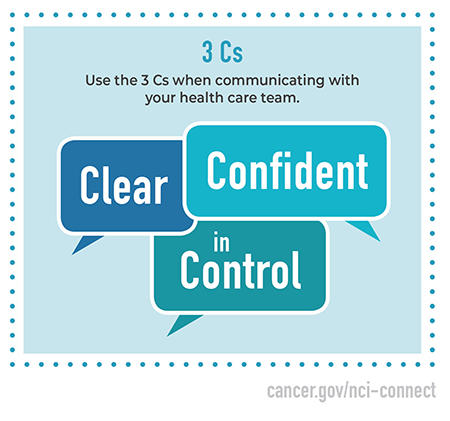Facing Cancer with Your Loved Ones
A brain or spine tumor diagnosis can impact your connections with those close to you. This may include your spouse or partner, children, caretakers, and friends. Changes in these relationships may be due to the symptoms you’re having, uncertainty about your illness, and the need to adapt to new roles and responsibilities.
Being prepared for relationship changes can help you and your loved ones keep your connections and adapt to your new normal,
Tips to Deal with Relationship Changes
- Create a plan to divide responsibilities. Revisit your plan if any changes occur.
- Create a system to check in with each other. Decide when and where you will meet to check in. During your check-ins, you can:
- Talk about each other’s day or week
- Share something you accomplished at work or home
- Talk about life and relationship changes and how you will deal with these unexpected changes
- Develop a shared goal to improve your relationship and share your progress
- Encourage each other
- Find support services like support groups or transportation services to help lighten you and your loved ones’ burdens.
- Set aside some regular fun time with your loved one. For example, you can go to dinner, go to a festival, or take a walk outdoors. If these activities are too hard, you can plan some alone time together or an activity in the home, such as a game or movie. Fun activities can help you connect outside of your doctor’s appointments.
- Ask your health care team to explain any changes you may experience.
- Make time for individual self-care, which can help you both recharge.
- Ask others for help. For example, have someone pick up the kids after school, ask older children to help with chores at home, or ask a friend to be with you so your loved one can run errands or have time to themselves. You could also ask a friend to take you to your appointment or take notes during it.
It’s important for your health to maintain relationships with those close to you. If you need to, talk to a therapist or counselor about any challenges you experience with loved ones.
Resources
Communicating with Your Health Care Team
Your health care team helps guide your journey with a brain or spine tumor. They can help you learn about your diagnosis and treatment. They can also provide support resources. You should be able to talk honestly and comfortably with them.
Do not assume your health care providers know what you’re going through. Every person with a brain or spine tumor is unique. It’s important to let them know about your physical and mental needs, so your treatment and care can be personalized to you.
Tips to Communicate with Your Health Care Team
- Write your symptoms and side effects in a journal or cell phone app. Include when and where the side effects happen, note what makes them better or worse, and describe how you treated them. Keeping a record will help you communicate with your doctor at your next appointment. The My STORITM app can help you keep track of your symptoms and self-care activities.
- Keep copies of your medical records and tests you have taken in a folder or another place that is easy to access.
- Bring someone to your appointments who can take notes, ask questions, and help discuss your care.
- Make a list of questions or goals for the appointment.
- Ask if you can record your visit.
- Ask your provider to slow down as they are talking or to repeat something that wasn’t clear to you.
- Bring something comforting with you to your appointments that helps you feel grounded, such as your favorite music, a book, or cards with positive messages.
- Be assertive when you talk to your health care team and use the "Three Cs." Be:
- Clear about what you want to say
- Confident in the information you want to share
- In Control of how you relay your message—give yourself time to collect your thoughts and communicate once you can express yourself effectively
Your health care team should always be aware of what is going on. Let them know when any new or concerning symptoms or side effects arise during or between appointments. Know whom to contact if you have concerns.
If your health care team isn’t meeting your care needs, then it could be time to seek out a different team. A cooperative health care team will respond to your needs, understand your specific diagnosis, and communicate effectively with you.
Resources
Communicating with Your Loved Ones
Talking to family and friends about your brain or spine tumor journey can be hard. You may worry that they won’t understand your feelings and needs. But sharing with people who support you can help you cope and may even increase your survival.
Family and friends may also want to help but aren’t sure what to do. Asking for help and telling them your needs lets them understand how they can help you. Use these tips to talk with your loved ones. Remember, they’re going through this emotional journey with you.
Tips to Communicate with Your Loved Ones
- Decide how much information you want to share. It’s okay to not tell everyone that you have been diagnosed with cancer.
- Consider sharing your treatment course with your loved ones so they can understand what you will go through.
- Set up a way to keep in touch with loved ones and assign a point of contact to send updates.
- Let your friends and family know that every conversation doesn’t need to be about your diagnosis and treatment.
- Spend time with friends and family doing normal activities. Watch sports, go to dinner, go outside for walks, or do the activities you enjoyed before your diagnosis to help you reconnect.
- Ask for help with physical tasks if you have weakness from symptoms or treatment.
- Use web-based tools to ask for help with meals and tasks that you may not be able to do during treatment.
- Tell your loved ones if any unexpected symptoms occur, such as seizures, so they know how to help. You may need to walk slower, sit, or lay down.
A diagnosis can be life changing. You may require more help with complicated (or even simple) tasks. Allow your loved ones to help you—they want to because they care for you.
You can also keep people updated on social media or websites designed for patients and survivors. Journaling on these platforms can help you express your anxieties while easily providing updates to your family and friends.
A positive attitude and support from friends, family, and your community can help your health and outlook on life.
Resources
Sharing Your Story
A brain or spine tumor diagnosis can consume your everyday life. From traveling to appointments and managing treatment side effects, you may be unable to participate in normal (or what was once your norma) daily life. This may make you feel like you don’t have much to share about your life now as a cancer survivor.
However, sharing your story could help you see that—even though your daily life has changed—your “new normal” is just as important. It can also help you cope with your diagnosis and accept your new normal. In addition, sharing your story can help you move forward in other areas of your life—relationships, returning to work, trying new hobbies—and making your life more meaningful. You are more than your diagnosis.
Sharing your story may also be important to your family and friends, so they know how you’re doing and can support the changes in your life.
Ways to Share Your Story
- Reflect on what you want to share in your story. You can share how your life has changed since your diagnosis, or what you have learned from your experiences with cancer.
- Start to write your story in a journal by topic, timeline, or however you are most comfortable.
- Keep it brief to help you accept the new aspects of your life. Write a short social media post, send a text message, or try blogging.
- Make a quick phone call to share a new activity you tried—or the good or bad news you received at your latest appointment.
Using any form of communication, long or short, can help you share your story. Positive feedback and engagement from your friends and family will remind you that you are important. Your new normal can be as exciting and rewarding as before your diagnosis.
Have a rare CNS tumor and want to share your story? Email us at nciconnect@mail.nih.gov.
Resources
Alvina's Quick Tip:
Journaling
To clear your mind and enhance your mood, NCI-CONNECT Health and Wellness Counselor Alvina Acquaye-Mallory says practicing journaling. Watch video






